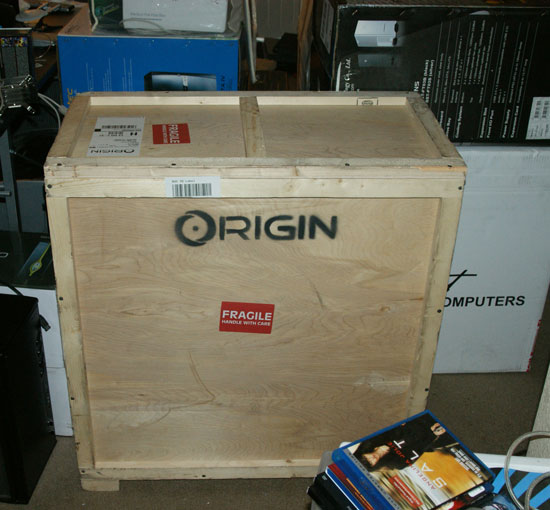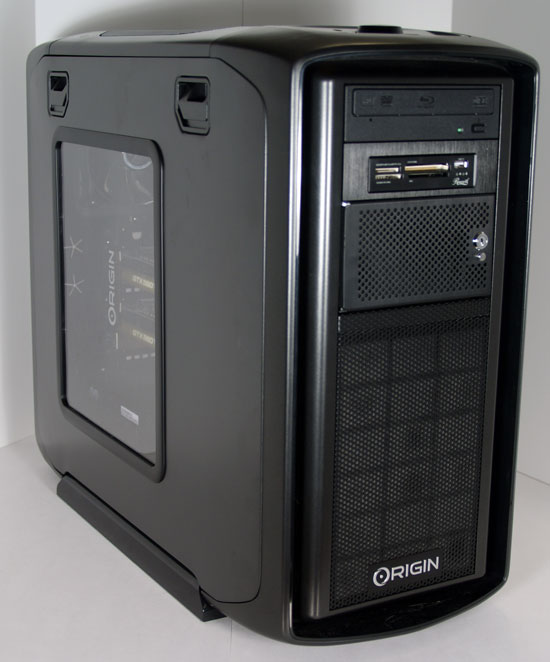Origin's Genesis: Flagship Bling
by Dustin Sklavos on April 2, 2011 2:00 PM ESTIntroducing the Origin Genesis
Now that we've been getting a fairly steady influx of desktop machines from boutiques, Origin PC is stepping into the ring by sending us their go-to flagship model, the Genesis. Origin is a boutique founded by former Alienware executives, and is relatively young compared to some of the other companies we've reviewed towers from. The Genesis is almost more of a brand than a flagship, but Origin is opting to put one of their best feet forward by sending us a configuration they're sure will do them proud against the competition.
After our pit stop with the iBuyPower LAN Warrior II, we're now back firmly in the realm of boutique desktop gaming towers. I should've known better when Kevin Wasielewski, the CEO, mentioned in his e-mail for me to contact him when the tower arrived with my thoughts on the packaging. Please try to ignore the mess, questionable taste in film, and mountain of additional hardware in the background needing my time and attention and get a load of this:

As I mentioned in the last review, I'm not a large man by any stretch of the imagination. So when the delivery man arrived in the morning and knocked on my door and asked me to help him bring a wooden crate up, I was understandably surprised. For scale, that's an Antec Mini P180 on the floor to the left of this 86 pound monstrosity. And what's inside?

As the proud owner of a Corsair Graphite 600T (the same case this Origin Genesis was built in), I can tell you that the packaging was decidedly American and absolute overkill, and I would've been more amused by it had I both the space and upper body strength to contend with it constructively.
| Origin Genesis Specifications | |
| Chassis | Corsair Graphite 600T with Side Window |
| Processor |
Intel Core i7-2600K @ 4.5GHz (45x100 BCLK) (spec: 4x3.4GHz, 32nm, 8MB L3, 95W) |
| Motherboard | ASUS P8P67 Pro Motherboard with P67 chipset |
| Memory | 2x4GB Kingston HyperX DDR3-1600 @ 1600MHz (expandable to 16GB) |
| Graphics |
2x EVGA NVIDIA GeForce GTX 560 Ti 1GB GDDR5 in SLI (384 CUDA Cores, 850MHz Core, 1701MHz Shaders, 4.1GHz RAM, 256-bit memory bus) |
| Hard Drive(s) |
Intel 510 128GB SATA 6Gbps SSD Western Digital Caviar Black 1TB 7200-RPM SATA 6Gbps HDD |
| Optical Drive(s) | Pioneer 12x BD-RE Drive |
| Networking |
Intel 82579V Gigabit Ethernet Bluetooth 2.1+EDR |
| Audio |
Realtek ALC892 HD Audio Speaker, mic, line-in, and surround jacks for 7.1 sound Digital and optical out |
| Front Side |
Optical drive Card reader with USB 2.0 |
| Top |
Headphone and mic jacks 4x USB 2.0 USB 3.0 6-pin FireWire Fan controller |
| Back Side |
2x PS/2 Optical and digital out 2x eSATA 6x USB 2.0 Bluetooth 6-pin FireWire 2x USB 3.0 Ethernet Speaker, mic, line-in, and surround jacks for 7.1 sound |
| Operating System | Windows 7 Home Premium 64-bit |
| Dimensions | 10.4" x 23.3" x 20" (WxDxH) |
| Weight | 28 lbs (case only) |
| Extras |
Silverstone 750W Power Supply 12-in-1 Card Reader Asetek 570LC Liquid Cooling SATA Hot-swap bay Internal LED lighting |
| Warranty | 1-year limited warranty and lifetime phone support |
| Pricing |
Starts at $1,337 Review system on website at $2,549 |
Now that Intel has begun shipping fixed P67/H67 chipsets in earnest, Sandy Bridge is all over the place in boutique builds, and Origin's Genesis is no different. It sports an Intel Core i7-2600K, the weapon of choice for pretty much everyone these days, with a healthy overclock of 4.5GHz. Origin advertises being able to push this chip over 5GHz and given what we know of i7-2600K overclocking that doesn't seem entirely unreasonable, though you'll pay for the privilege. They keep the processor cool with an Asetek 570LC 120mm watercooling kit.
The other major player in the Genesis is the pair of EVGA GeForce GTX 560 Ti cards running in SLI. These cards both feature a mild overclock to 850MHz on the core, 1.7GHz on the 384 shaders, and 4.1GHz on the GDDR5 attached to a 256-bit memory bus. A pair of 1GB GTX 460's in SLI was (and to an extent still is) a price/performance king, and the two 560's hopefully should build on that.
Origin's remaining component choices are solid and top shelf: a shiny new Intel 510 128GB SSD is used as a system drive while the boutique favorite Western Digital Caviar Black 1TB SATA 6Gbps hard disk handles storage duties. It's also nice to see a full 8GB of DDR3-1600 from a reputable brand, a blu-ray burner, and the SATA hotswap cage is a welcome nice touch.
Finally, everything is housed in Corsair's Graphite 600T, a case we've had the privilege of reviewing in the past, and powered by a respectable Silverstone 750-watt power supply. The 600T is no stranger to water cooling, but we'll see that not everything here is quite as good as it could be. Origin is also in a privileged position with Corsair and as a result are among the first to get their hands on the new windowed side panel which they make use of by illuminating the internals with strips of white LED lights.
What you'll want to notice are two components that aren't immediately available on the configuration page of Origin's site: the Corsair Graphite 600T and the SATA hot-swap bay. Origin will build systems by request in other enclosures, and the hot-swap bay becomes an option they can add alongside using the 600T.










39 Comments
View All Comments
MeanBruce - Sunday, April 3, 2011 - link
The windowed side panel is available NOW for the 600T at the Corsair website. Personally I would go with the new Corsair Obsidian 650D chassis, with it's understated elegance, it's exceptionally urbane. I have one in my office!;)HilbertSpace - Sunday, April 3, 2011 - link
First SC 2 graph is wrong - no way the Puget system should be leading.Dustin Sklavos - Sunday, April 3, 2011 - link
Graph is likely correct. In my experience Radeons have less CPU overhead in SC2. Couple that with the fact that the Genesis is driving two video cards instead of one and it does balance out.iamezza - Sunday, April 3, 2011 - link
Another good review thanks Dustin!If you are going to keep reviewing these massive boutique systems maybe you could claim a gym membership as a tax deduction :)
Alex99a - Monday, April 4, 2011 - link
quoting..."I can tell you that the packaging was decidedly American and absolute overkill...."
Well, now what is THAT supposed to mean? Please explain to me the concept of "decidedly American". I come to AnandTech for good tech info and reviews, not stereotyping anti-American slams.
Oh, and if I ever do buy an expensive boutique computer system, i hope it DOES come in a big honkin' wooden crate to hopefully survive the journey intact.
Ninhalem - Monday, April 4, 2011 - link
Because American packaging is known to be of the highest quality, because if it isn't, you're going to have very irate customers wanting to know why you didn't package their dear products like a Abrams tank.strikeback03 - Monday, April 4, 2011 - link
Bottom of the page on noise, hat, and power consumption, you say "CyberPower's system has a 4.4GHz overclock and it still manages to keep idle power low by requiring 0.7V less to hit its overclock than the Origin Genesis does. " I assume you meant to say 0.07V?EBH - Monday, April 4, 2011 - link
For anything more than 1000$ I would expect more than:Audio
Realtek ALC892 HD Audio
Speaker, mic, line-in, and surround jacks for 7.1 sound
Digital and optical out
veri745 - Tuesday, April 5, 2011 - link
"CyberPower's system has a 4.4GHz overclock and it still manages to keep idle power low by requiring 0.7V less to hit its overclock than the Origin Genesis does."I think you probably mean '0.07V less', unless the Cyberpower system is running at 0.72V